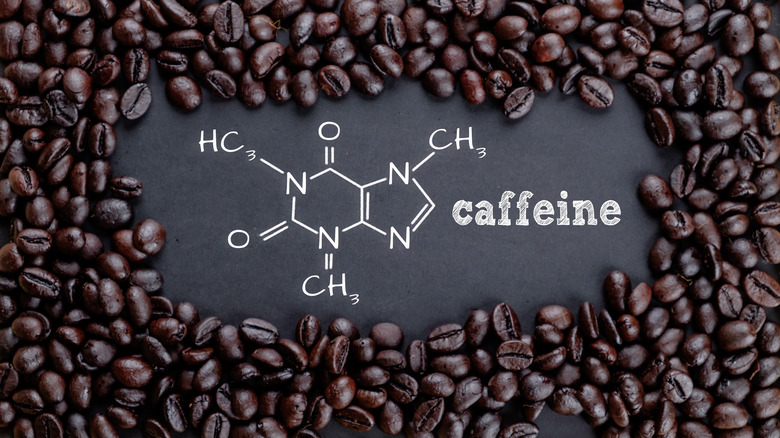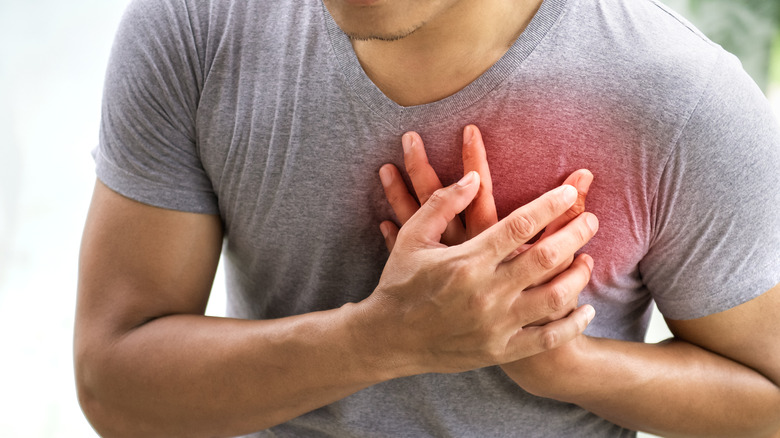Can Too Much Caffeine Kill You?
Quick: what is the most-consumed, mind-altering drug in the United States? Hint: It's not alcohol or cannabis, nor is it prescription drugs. The most popular drug in this country, if we define "drug" as a chemical or substance that changes one's consciousness, is caffeine. And it's not even close: according to Kaukini Health System, about 90 percent of Americans consume caffeine, in one form or another, at least once per day. The drug, classified as a mild central nervous stimulant, can be found in sodas, coffee, tea, chocolate, energy drinks, and dietary supplements, among other sources. Users enjoy the temporary boost in energy and alertness the substance provides.
Ingesting too much caffeine, whether over the short term or the long term, can have some adverse health effects, according to MyHealthAlberta. For example, it can cause shaking, irritability, and in some cases, a fast and irregular heartbeat. And in extreme cases, an overdose of caffeine can be fatal.
It takes a lot, but yes, caffeine can kill you
Caffeine, like thousands of other substances, has what is known as a median lethal dose (LD50) –- that is, the amount that would kill at least half of a population of test subjects (usually lab rats). According to Science Direct, the LD50 of caffeine is 300mg per kilogram of body weight. In other words, for a person weighing about 220 pounds, a fatal dose of caffeine would be 30 grams –- a bit over an ounce. By comparison, the amount of caffeine in an average cup of coffee is approximately 95mg, according to Healthline.
When the numbers are crunched, that means that it would take approximately 315 cups of coffee to reach a potentially-fatal dose of caffeine (although it bears noting that the caffeine content in a cup of coffee can vary greatly due to a host of factors). For industrial-strength doses of caffeine, energy drinks are where it's at: for example, according to Spoon University, Five-Hour Energy has the most caffeine of any commercially-available energy drink, with 200mg per serving; just two of them would match the Mayo Clinic's limit of 400mg of caffeine per day. However, to approach the LD50 of caffeine, a user would have to consume 150 of them.
As you can see, overdosing on caffeine would take a concerted effort, and the user would more than likely be vomiting well before he or she got even close to the overdose threshold. However, just because it's difficult to do doesn't mean that it can't be done, nor that it hasn't been done.
People have died from caffeine overdoses
Just because caffeine-containing consumer products like sodas and energy drinks contain a comparatively trivial amount of caffeine, that doesn't mean it's impossible to overdose on the chemical; you just have to really work at it. That, or make a compounding series of huge mistakes.
That's what happened to fitness trainer Tom Mansfield, according to IFL Science. The father of two was using pure caffeine as a performance enhancer (which can easily be purchased from a chemical supply company without any sort of license) and used the wrong scale to measure his dose. Because the device he was using couldn't measure in milligrams, Mansfield actually measured in grams and wound up taking the equivalent of the caffeine in 200 cups of coffee. Almost immediately he complained of chest pain, and he was dead within 45 minutes. Similarly, in 2017, a 16-year-old South Carolina boy died of caffeine overdose after consuming "a large Diet Mountain Dew, a cafe latte from McDonald's and also some type of energy drink" within two hours of his death, according to the coroner (via NBC News).
Still, death by caffeine overdose is comparatively rare. As Medical News Today reports, in 2018 a team reviewed decades' worth of medical journals, and identified 92 reported deaths attributable to caffeine overdose.


